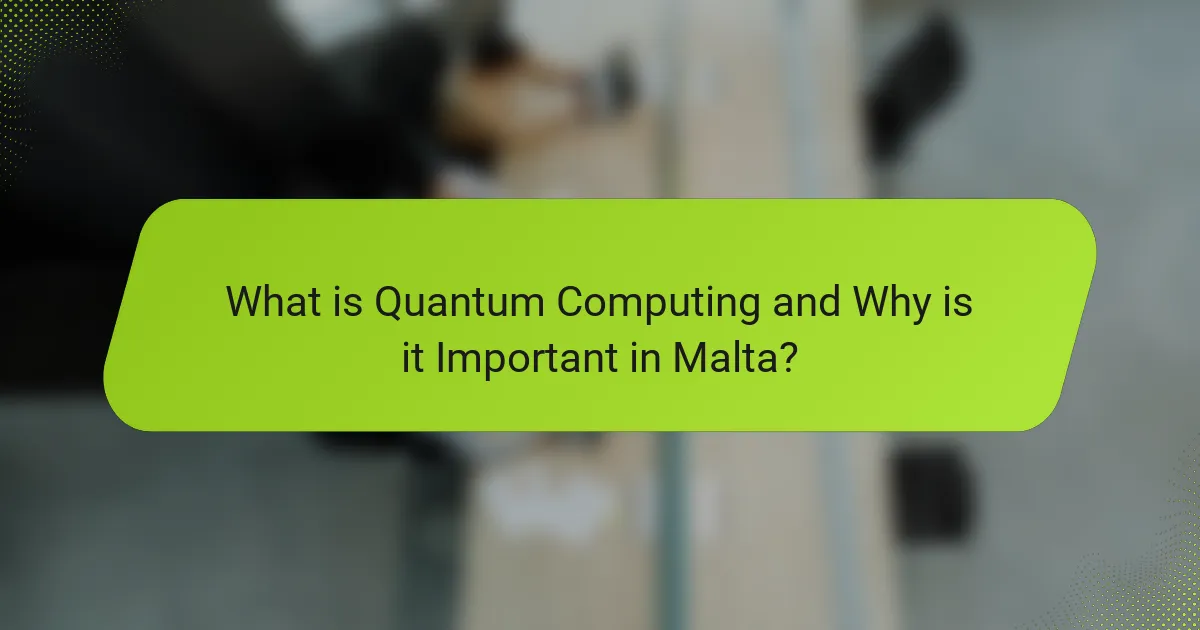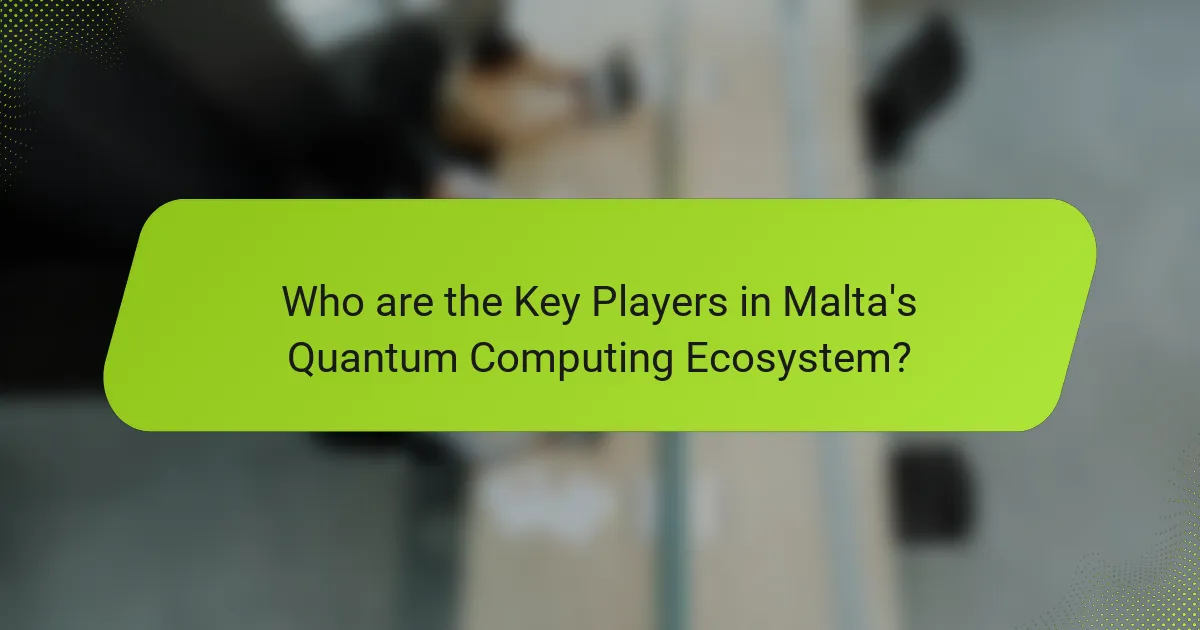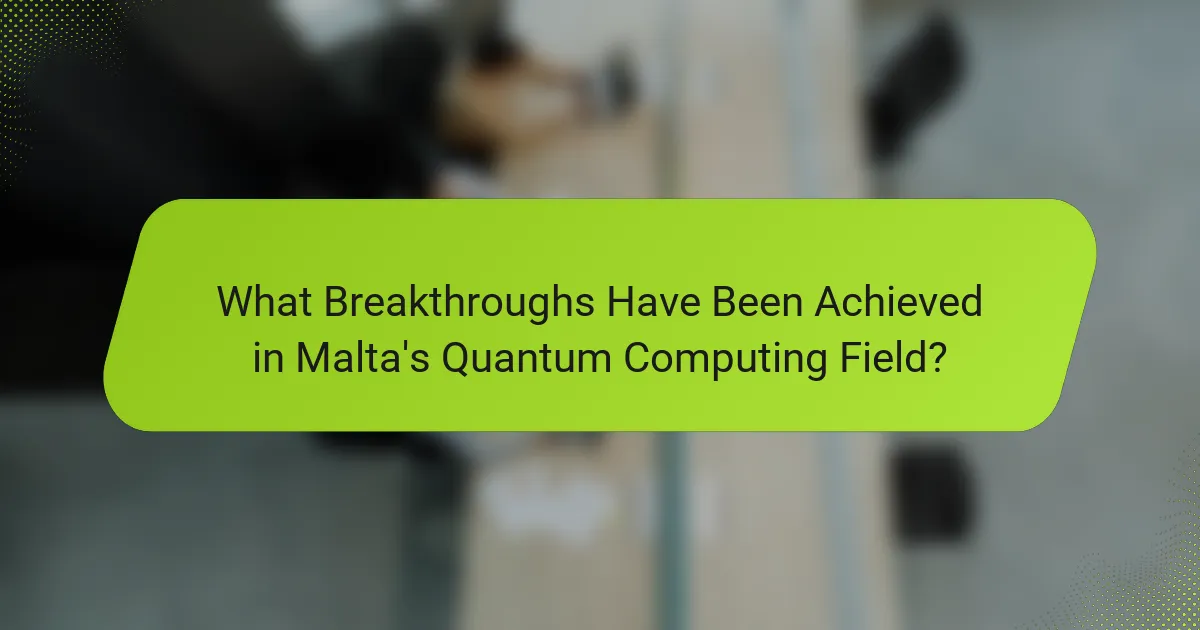
What is Quantum Computing and Why is it Important in Malta?
Quantum computing is a type of computation that uses quantum bits or qubits. Unlike classical bits, qubits can exist in multiple states simultaneously. This allows quantum computers to solve complex problems much faster than traditional computers. In Malta, quantum computing is important for several reasons. It can drive innovation in technology and research. The Maltese government is investing in quantum initiatives to enhance its digital economy. Additionally, local universities are collaborating on quantum research projects. These efforts position Malta as a potential hub for quantum technology in Europe.
How does Quantum Computing differ from classical computing?
Quantum computing differs from classical computing primarily in its use of quantum bits, or qubits. Classical computing relies on bits, which can be either 0 or 1. In contrast, qubits can exist in multiple states simultaneously due to superposition. This allows quantum computers to perform complex calculations at unprecedented speeds.
Additionally, quantum computing utilizes entanglement, a phenomenon where qubits become interconnected. This enables the sharing of information across qubits, enhancing computational power. Classical computers cannot achieve this level of interconnectedness.
The processing capabilities of quantum computers can solve problems that are infeasible for classical computers. For instance, quantum algorithms can factor large numbers exponentially faster. This has implications for cryptography and optimization problems.
Research has shown that quantum computers can outperform classical systems in specific tasks. The 2020 Google Quantum AI experiment demonstrated quantum supremacy by solving a problem in 200 seconds that would take classical computers thousands of years.
These fundamental differences highlight the transformative potential of quantum computing compared to classical computing.
What are the fundamental principles of Quantum Computing?
Quantum computing is based on principles of superposition, entanglement, and quantum interference. Superposition allows quantum bits (qubits) to exist in multiple states simultaneously. This enables quantum computers to process a vast amount of information at once. Entanglement creates a connection between qubits, allowing them to influence each other regardless of distance. This property can enhance computational power and speed. Quantum interference helps in amplifying correct paths and canceling out incorrect ones during calculations. Together, these principles enable quantum computers to solve complex problems more efficiently than classical computers.
Why is Quantum Computing considered a breakthrough technology?
Quantum computing is considered a breakthrough technology due to its ability to perform complex calculations at unprecedented speeds. Traditional computers use bits as the smallest unit of data, while quantum computers use qubits. Qubits can exist in multiple states simultaneously, allowing quantum computers to process vast amounts of information in parallel. This capability enables them to solve problems that are currently intractable for classical computers. For instance, quantum algorithms can factor large numbers exponentially faster, impacting fields like cryptography. Additionally, quantum computing can optimize complex systems, such as supply chains and financial models, with high efficiency. The development of quantum supremacy, demonstrated by Google in 2019, further solidifies its status as a transformative technology.
What is the current state of Quantum Computing in Malta?
Quantum computing in Malta is currently in its early developmental stages. The Maltese government has shown interest in establishing a quantum technology ecosystem. Initiatives are underway to foster research and collaboration between academia and industry. Notable institutions, such as the University of Malta, are exploring quantum computing applications. The government is also promoting investment in technology sectors, including quantum computing. International collaborations are being sought to enhance local expertise. Malta aims to position itself as a hub for quantum innovation in the Mediterranean region. These efforts reflect a growing recognition of quantum computing’s potential impact on various industries.
Which institutions are leading Quantum Computing research in Malta?
The leading institutions in Quantum Computing research in Malta are the University of Malta and the Malta Chamber of Commerce. The University of Malta has established a dedicated research group focused on quantum technologies. This group collaborates with international partners to advance quantum computing initiatives. The Malta Chamber of Commerce supports innovation in technology sectors, including quantum computing. They facilitate partnerships between academia and industry. These institutions are pivotal in fostering a quantum research ecosystem in Malta. Their efforts contribute to the country’s growing prominence in this field.
What recent developments have occurred in Malta’s Quantum Computing landscape?
Malta has recently made significant strides in its quantum computing landscape. The establishment of the Malta Quantum Computing Initiative aims to foster research and collaboration. This initiative involves partnerships with international universities and tech companies. Notable investments have been made in quantum research facilities. The government has allocated funding to support educational programs in quantum technologies. Additionally, Malta is hosting conferences to attract global experts in the field. These developments position Malta as a growing hub for quantum innovation in Europe.

Who are the Key Players in Malta’s Quantum Computing Ecosystem?
The key players in Malta’s quantum computing ecosystem include the University of Malta, the Malta Chamber of Commerce, and various tech startups. The University of Malta is actively involved in research and development in quantum technologies. The Malta Chamber of Commerce promotes collaboration between businesses and academic institutions. Additionally, startups like Quantum Malta are focusing on innovative quantum solutions. These entities contribute to the growth and advancement of quantum computing in Malta. Their efforts are crucial for establishing Malta as a hub for quantum technology in Europe.
What roles do universities play in advancing Quantum Computing in Malta?
Universities in Malta play a significant role in advancing Quantum Computing. They contribute through research initiatives focused on quantum technologies. Academic institutions collaborate with industry partners to drive innovation. They offer specialized programs and courses to educate future professionals in the field. Universities also host workshops and conferences to disseminate knowledge. Research centers within these institutions conduct cutting-edge studies on quantum algorithms and hardware. Collaboration with international universities enhances the local quantum ecosystem. Overall, universities are pivotal in developing expertise and fostering advancements in Quantum Computing in Malta.
Which universities are involved in Quantum Computing research?
The universities involved in Quantum Computing research include MIT, Stanford University, and the University of California, Berkeley. These institutions have established dedicated quantum research centers. For example, MIT’s Research Laboratory of Electronics focuses on quantum information science. Stanford University hosts the Stanford Quantum Initiative, promoting interdisciplinary research. The University of California, Berkeley, has the Berkeley Quantum Information and Computation Center. These universities contribute significantly to advancements in quantum technologies and collaborate with industry partners. Their research often leads to breakthroughs in quantum algorithms and hardware development.
What programs or initiatives are they offering?
It is not possible to provide a specific answer regarding the programs or initiatives offered in the context of quantum computing in Malta. There is insufficient information available on this topic as it pertains to the original request.
Who are the private sector contributors to Malta’s Quantum Computing growth?
The private sector contributors to Malta’s Quantum Computing growth include several technology firms and startups. Notable companies such as Exalens and the Malta Chamber of Commerce play significant roles. Exalens focuses on quantum software development. The Malta Chamber of Commerce supports innovation and collaboration in the tech sector. Additionally, international partnerships with companies like IBM enhance Malta’s capabilities. These contributors are actively involved in research and development initiatives. Their efforts aim to position Malta as a hub for quantum technology in Europe.
What companies are investing in Quantum Computing technology?
IBM, Google, Microsoft, and D-Wave are major companies investing in Quantum Computing technology. IBM has committed significant resources to develop quantum processors and software. Google achieved a milestone in quantum supremacy with its Sycamore processor. Microsoft focuses on quantum development through its Azure Quantum platform. D-Wave specializes in quantum annealing technology. These companies are at the forefront of advancing quantum computing capabilities. Their investments drive research and development in this emerging field.
How are these companies collaborating with academic institutions?
Companies in the quantum computing sector are collaborating with academic institutions through research partnerships and joint projects. These collaborations often focus on advancing quantum technologies and developing innovative applications. For instance, companies provide funding and resources for academic research initiatives. In return, academic institutions contribute their expertise and access to cutting-edge facilities. Such partnerships enhance knowledge transfer between industry and academia. They also facilitate internships and training programs for students, bridging the gap between education and practical experience. This synergy fosters innovation and accelerates the development of quantum computing solutions.

What Breakthroughs Have Been Achieved in Malta’s Quantum Computing Field?
Malta has made significant breakthroughs in quantum computing. The establishment of the Quantum Computing Research Center in 2021 marked a pivotal moment. This center focuses on developing quantum algorithms and applications. Collaborations with international universities enhance research capabilities. Malta’s government supports initiatives to foster innovation in this field. Notable advancements include the development of quantum communication protocols. These protocols aim to improve data security in telecommunications. The country’s strategic location also positions it as a hub for quantum technology in Europe.
What notable research projects have emerged from Malta’s Quantum Computing initiatives?
Notable research projects from Malta’s Quantum Computing initiatives include the Quantum Computing Research Group at the University of Malta. This group focuses on quantum algorithms and their applications. Another significant project is the collaboration with IBM on quantum computing education and resources. The Malta Chamber of Commerce also supports initiatives to integrate quantum technologies in various sectors. These projects aim to position Malta as a leader in quantum research and innovation.
How do these projects impact the global Quantum Computing community?
These projects significantly enhance the global Quantum Computing community by fostering innovation and collaboration. They attract international talent and investment, boosting research capabilities. Increased funding leads to advanced technological developments. Collaborative efforts among institutions promote knowledge sharing. These projects also facilitate the establishment of industry standards. They encourage the commercialization of quantum technologies. Ultimately, they position Malta as a key player in the global quantum landscape. This positioning enhances Malta’s visibility and influence in international quantum discussions and initiatives.
What are the practical applications of these breakthroughs?
Practical applications of breakthroughs in quantum computing include enhanced data processing capabilities. Quantum computers can solve complex problems faster than classical computers. This speed can benefit industries like pharmaceuticals by accelerating drug discovery. Financial services can utilize quantum algorithms for risk assessment and optimization. Additionally, quantum computing aids in cryptography, improving data security. These advancements lead to more efficient supply chain management and logistics. Overall, the practical applications impact various sectors by optimizing processes and reducing costs.
What innovations in Quantum Computing technology have originated in Malta?
There are currently no significant innovations in Quantum Computing technology that have originated in Malta. The country’s research and development in this field is still in its early stages. While Malta is exploring advancements in technology, specific contributions to Quantum Computing remain limited. The local academic and research institutions are beginning to engage with this technology, but notable breakthroughs have yet to be reported. As the field evolves, Malta may see future developments, but as of now, there are no documented innovations.
What unique solutions or technologies have been developed?
Unique solutions in quantum computing include quantum algorithms and quantum cryptography. Quantum algorithms, like Shor’s and Grover’s, offer exponential speedup for specific problems. Quantum cryptography enables secure communication through quantum key distribution. Technologies such as superconducting qubits and trapped ions have been developed for building quantum computers. Malta’s initiatives focus on integrating these technologies into local industries. Collaboration with international research institutions enhances Malta’s quantum capabilities. As a result, Malta aims to position itself as a hub for quantum innovation in Europe.
How do these innovations compare to global advancements?
The innovations in quantum computing in Malta are significant but still lag behind global advancements. Malta has made strides with local research initiatives and collaborations. However, countries like the United States and China lead in funding and technological breakthroughs. For instance, the U.S. invested over $1 billion in quantum research in 2021 alone. In comparison, Malta’s investment is considerably lower, focusing primarily on academic partnerships. Global leaders have established extensive ecosystems, including startups and corporate involvement, which Malta is still developing. Therefore, while Malta’s innovations are promising, they are not yet at the forefront of global advancements in quantum computing.

What are the Future Prospects for Quantum Computing in Malta?
Future prospects for quantum computing in Malta are promising. The Maltese government is actively investing in technology and innovation. Initiatives like the Malta Digital Innovation Authority support advancements in this field. Partnerships with universities and research institutions are being established. These collaborations aim to foster talent and knowledge in quantum technologies. Malta’s strategic location in Europe enhances its appeal for tech companies. The growing interest in quantum computing globally bodes well for Malta’s future in this sector. Malta’s commitment to digital transformation will likely accelerate development in quantum computing.
What challenges does Malta face in advancing Quantum Computing?
Malta faces several challenges in advancing quantum computing. Limited funding for research and development hampers progress. A shortage of skilled professionals in the field restricts innovation. Infrastructure for quantum technology is still underdeveloped. Collaboration between academia and industry is insufficient. Regulatory frameworks are not yet adapted for quantum advancements. These factors collectively slow Malta’s ability to compete in the global quantum landscape.
How can these challenges be addressed?
Addressing challenges in quantum computing in Malta requires strategic collaboration among key stakeholders. Government support can enhance funding for research initiatives. Educational institutions should develop specialized programs to train a skilled workforce. Industry partnerships can foster innovation through shared resources and expertise. Establishing a regulatory framework will ensure ethical standards and compliance. Investment in infrastructure is essential to support advanced research facilities. International collaboration can provide access to global expertise and resources. Continuous public engagement will raise awareness and interest in quantum technologies. These measures collectively strengthen Malta’s position in the quantum computing landscape.
What resources are needed for future growth?
Future growth in quantum computing in Malta requires skilled workforce development, advanced research facilities, and robust funding. A skilled workforce is essential for innovation and application in quantum technologies. Advanced research facilities support experimentation and development of quantum systems. Robust funding from government and private sectors enables research initiatives and infrastructure development. Collaboration with international research institutions enhances knowledge transfer and access to cutting-edge technology. These resources collectively drive advancements in Malta’s quantum computing landscape.
What opportunities exist for collaboration in Malta’s Quantum Computing sector?
Collaboration opportunities in Malta’s Quantum Computing sector include partnerships between academia and industry. Universities like the University of Malta are actively engaging in quantum research. They seek industry partners to translate theoretical advancements into practical applications. Government initiatives also encourage collaboration through funding programs. These programs aim to stimulate innovation and attract international companies. Networking events and conferences facilitate connections among stakeholders. This ecosystem promotes knowledge sharing and resource pooling. The presence of tech hubs in Malta further enhances collaborative efforts.
How can international partnerships enhance Malta’s Quantum Computing initiatives?
International partnerships can enhance Malta’s Quantum Computing initiatives by providing access to advanced research and technology. Collaborating with global leaders in quantum computing can facilitate knowledge transfer. This exchange of expertise can accelerate innovation in Malta’s local ecosystem. Additionally, partnerships can attract funding and investment from international sources. Increased financial resources can support infrastructure development and talent acquisition. Moreover, international collaborations can open up opportunities for joint research projects. These projects can lead to breakthroughs that benefit Malta’s quantum computing landscape. Ultimately, partnerships can position Malta as a competitive player in the global quantum computing arena.
What role can government policy play in fostering innovation?
Government policy can significantly foster innovation by creating a supportive ecosystem. It can provide funding for research and development. This funding enables startups and established companies to explore new technologies. Policies can also establish tax incentives for businesses investing in innovation. Such incentives encourage companies to allocate resources towards research. Additionally, government regulations can promote collaboration between academia and industry. This collaboration leads to knowledge transfer and practical applications of research. Furthermore, government initiatives can focus on education and workforce development. A skilled workforce is essential for driving innovation in emerging fields like quantum computing. Overall, effective government policy aligns resources, incentives, and regulations to stimulate innovation.
What practical steps can stakeholders take to support Quantum Computing development in Malta?
Stakeholders can support Quantum Computing development in Malta by investing in research and education initiatives. Establishing partnerships with universities can enhance curriculum and research opportunities. Funding local startups focused on quantum technologies can foster innovation. Creating grants for quantum research projects will encourage academic and industry collaboration. Hosting workshops and conferences will facilitate knowledge sharing among experts. Forming a national quantum strategy can align efforts across sectors. Engaging with international quantum networks can provide access to global expertise. These steps can position Malta as a competitive player in the quantum computing landscape.
How can individuals and organizations get involved in Quantum Computing initiatives?
Individuals and organizations can get involved in Quantum Computing initiatives by participating in educational programs and workshops. Many universities offer courses on quantum computing fundamentals. These programs provide foundational knowledge and skills. Organizations can collaborate with academic institutions for research projects. Partnerships can lead to shared resources and expertise.
Additionally, individuals can join online communities and forums focused on quantum computing. These platforms facilitate knowledge exchange and networking. Organizations may also consider sponsoring quantum computing competitions or hackathons. Such events encourage innovation and attract talent.
Investing in quantum startups is another way for organizations to engage. This supports the development of new technologies. Furthermore, attending conferences and seminars can provide insights into industry trends. Networking at these events can lead to collaborative opportunities.
What best practices should be followed to maximize impact?
To maximize impact in quantum computing initiatives in Malta, collaboration among key stakeholders is essential. Engaging academic institutions, industry leaders, and government entities fosters innovation. Regular knowledge sharing through workshops and conferences enhances collective understanding. Investment in research and development is crucial for advancing technology. Establishing clear regulatory frameworks supports ethical practices and encourages investment. Focusing on practical applications ensures that research aligns with market needs. Continuous education and training programs develop a skilled workforce, vital for sustaining growth. These practices are supported by successful quantum initiatives globally, demonstrating their effectiveness in driving progress.
Quantum computing is the primary entity discussed in the article, focusing on its significance in Malta. The article outlines the differences between quantum and classical computing, highlighting the principles of superposition, entanglement, and quantum interference. It details Malta’s current state in quantum computing, including key players like the University of Malta and the Malta Chamber of Commerce, as well as recent developments and breakthroughs in research. The article also addresses future prospects, challenges, and opportunities for collaboration in Malta’s quantum computing sector, emphasizing the potential for growth and innovation in this emerging field.
